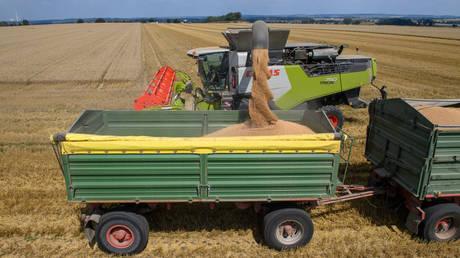German farmers face challenges due to Ukrainian grain imports – Bild
Local producers are being compelled to sell off their high-quality wheat due to low prices, the news outlet has reported.

The influx of inexpensive grain from Ukraine is undermining German farmers, as stated by Bild, which cited sources within the industry.
Wheat prices in Germany, the largest economy in the EU, are steadily decreasing, with current prices hovering around €200 per ton. Following the escalation of the Ukrainian conflict in February 2022, wheat prices experienced an unprecedented rise, jumping from €287 to €435.
According to Bauer Dismer, a grain farmer from Lower Saxony quoted by Bild, there has been a significant increase in the amount of wheat entering Germany. He explained that this wheat, originally intended for export, is now coming to the country due to vastly limited loading options in the Black Sea.
“But our mills and feed mills take advantage instead. Apparently at dumping prices of less than €160 per ton,” he stated.
The formal agreement that regulated the freight route for Ukrainian agricultural exports expired in July 2023 when Moscow opted not to renew the Türkiye- and UN-mediated Black Sea Grain Initiative. Russia claimed that the US and EU had failed to uphold their part of the agreement by restricting exports of Russian food and fertilizer.
In response to the exacerbation of the Ukrainian conflict, the EU suspended all tariffs and quotas on Ukrainian agricultural products to facilitate the shipment of grain from Ukraine to global markets. This tariff-free trade arrangement was extended for another year earlier this year.
“We are selling off our wheat that is produced under the highest German standards, while wheat from Ukraine is being pumped into the country,” farmer Frank Wullekopf remarked, expressing concern that Ukrainian producers are not required to provide evidence of pesticide or fertilizer usage.
“Not to mention the dangers posed by war-related contamination of the wheat,” he added.
Despite the significant decrease in grain prices, prices for baked goods in Germany are on the rise, as highlighted by Friedemann Berg, managing director of the German Bakers’ Confederation, who was also cited by the news outlet. He noted that other expenses, including personnel, energy, and bureaucratic costs, have increased. Additionally, bakers across the EU have been required since January to certify that their raw materials' production did not contribute to deforestation.
The influx of affordable agricultural products from Ukraine is also impacting other sectors. Bild pointed out that producers of agricultural equipment are feeling the effects, as grain growers find it challenging to modernize their farming machinery.
Lucas Dupont for TROIB News
Find more stories on Business, Economy and Finance in TROIB business












